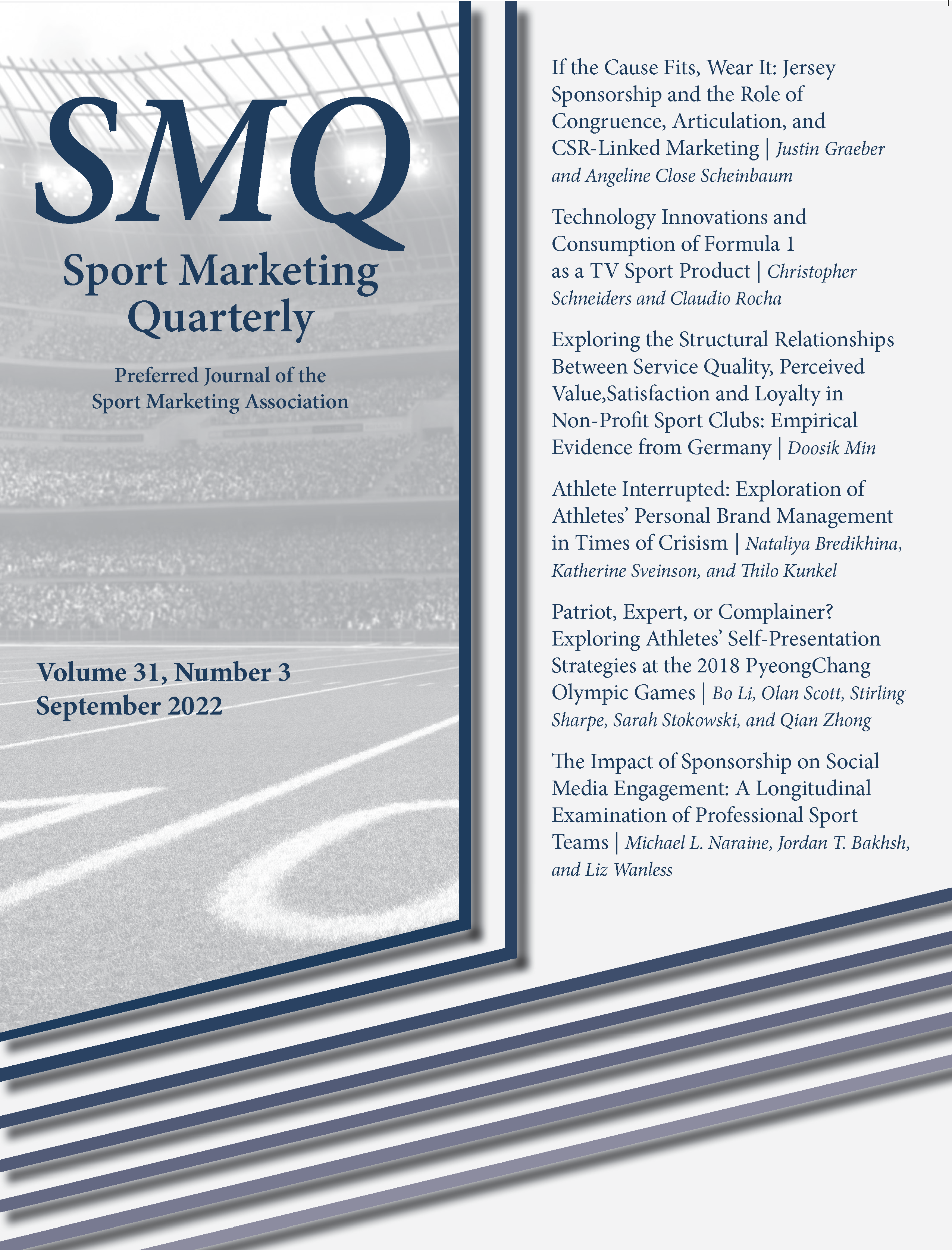Sports Marketing Quarterly
Issue 31:3 – September, 2022
Issue 31:3 – September, 2022

The aim is to advance the understanding of how brand-property congruence and articulation strategy influence the perception of jersey sponsorships and how consumer-level factors such as team identification affect sponsorship outcomes. Different types of fi t and sponsor categories were tested to determine the most effective type of fi t as determined by outcomes of attitude toward team and sponsor, sponsor patronage, and perceptions of team and sponsor social responsibility. With a pretest (n=154) and two experiments (n=169, n=172), results indicated sponsors with a functional-based fit with the team result in greater purchase intention than corporate sponsors with a schema-based congruence. However, sponsors that were schema-based showed better performance in driving fan attitude. The work adds to schema-congruity theory by examining multiple types of fi t in a new context of jersey sponsorships.
Christopher Schneiders and Claudio Rocha
Drawing upon the technology acceptance model, the aim of this study was to describe the effects of technology innovations in Formula 1 (F1) on fans’ satisfaction and commitment to consumption of F1 as a TV product, controlling for identification with F1 and specific teams and drivers. We surveyed F1 fans (N = 449) contacted via web-based forums. Results of a structural equation modeling showed that positive perceptions of technology innovation lead to satisfaction with F1 as a TV product, which in turn leads to commitment to consumption. Highly identified fans are committed to consuming the sport on TV, but they do not necessarily accept F1 new technologies. Technology changes that increase predictability and competitive unbalance are not well received and may lead to less consumption of F1 on TV. F1 managers need to make careful analysis before introducing new technology, which might decrease the TV audience for F1 races.
Nonprofit sport clubs encounter various challenges, including limited resources and a competitive environment. It is therefore vital to implement strategic management in order to ensure that the services provided to members are of top quality. Th is study explores the importance of service quality in determining perceived value, satisfaction, and loyalty, specifically for nonprofit sport clubs in Germany, collecting data from 24 sport clubs (N = 427). The findings of the study indicated that (1) service quality has a major impact on perceived value, satisfaction, and loyalty, which demonstrates the significance of service quality as a determinant of perceived value, satisfaction, and loyalty; (2) perceived value is found to be a significant factor affecting satisfaction and loyalty as well as a mediator between service quality and satisfaction; and (3) satisfaction has a positive influence on loyalty and mediates the relationship between service quality and loyalty. The empirical results highlight the importance of understanding how the elements of service quality play a crucial role in the retention of sport club members.
Times of crisis impact the careers and brand management of athletes. Th e COVID-19 pandemic serves as the research context as we explore how athletes react, cope with, and respond to external disturbances through modifications in their personal brand management. We employed a qualitative approach, drawing on semi-structured interviews with elite athletes (N=15). Th e themes were verified by reviewing participants’ Instagram posts. The findings show that the COVID-19 context has created unique challenges for athletes’ careers and personal branding, including emotional distress, interruptions of athletic labor, and a void in the sports-related content they rely upon in their branding. Th rough emotional capital, coping, and identification of marketing opportunities, the athletes addressed the challenges, increasingly leveraging digital channels to preserve and expand their brand and remain relevant in the market. Findings have implications for athletes experiencing temporary career and brand-related interruptions such as during external disturbances, illness, pregnancy, or injury.
Media coverage of the Winter Olympic Games provides an invaluable opportunity for athletes to promote themselves to a global audience that otherwise would not be reached through regular calendar events. An important element of athlete promotion occurs during press conferences when athletes speak to global media after winning a medal. The purpose of this study was to investigate how Olympic medalists presented themselves in front of the media aft er achieving Olympic success. A thematic analysis was conducted using press conference transcripts from 307 Olympic medalists during the 2018 PyeongChang Winter Olympic Games. The results indicated that athletes were likely to use media opportunities to self-promote their achievements, share secrets and stories, exhibit gratefulness, protest, show patriotism, and provide expert opinion. Overall, six categories of self-presentation were identified and discussed. Practical and theoretical implications are offered throughout, including a contribution to self-presentation theory and suggestions for athlete media literacy training.
Social media has become an important frontier in the sport sponsorship paradigm (Dees, 2011), offering brands a powerful mechanism to stimulate consumer engagement (Vale & Fernandes, 2018). Despite this potential, the extent to which social media content, as part of a sport sponsorship’s leveraging activities, can yield consumer engagement behaviors is unknown. Thus, the purpose of this study was to examine the impact of integrating sponsors into the social media posts of sport organizations on fan engagement. A total of 13,542 Instagram posts from four professional sports teams were extracted from 2017–2019. A regression analysis revealed that sponsored content negatively affected engagement levels. Consequently, brands need to be more cognizant that simply sponsoring content in an inauthentic, forceable manner may not yield the results they are seeking through their association. Furthermore, sport organizations need to reconsider their social media strategy, working with partners to organically embed sponsors into content.